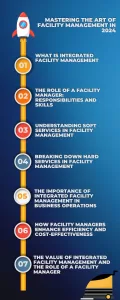
1. Introduction to Integrated Facility Management
The field of facility management plays a crucial role in ensuring the smooth operations of commercial buildings, office spaces, and other facilities. From maintenance and security to cleaning and space management, facility managers are responsible for overseeing a wide range of services. In recent years, there has been a growing need for an integrated approach to facility management, which involves the coordination and consolidation of various services. This blog explores the role of a facility manager and delves into the difference between soft services (such as cleaning and landscaping) and hard services (such as HVAC and electrical maintenance). Read on to learn more about integrated facility management and the top facility management companies in India, including their services in Mumbai and Bangalore.
2. The Role of a Facility Manager: Responsibilities and Skills
Facility managers play a pivotal role in the effective functioning of commercial buildings and office spaces. They are responsible for a wide range of duties, including maintenance, security, cleaning, and space management. The role requires a diverse set of skills, including problem-solving, leadership, and communication.
One of the key responsibilities of a facility manager is to ensure that all building systems and equipment are well-maintained. This includes overseeing the maintenance of HVAC systems, electrical systems, and other technical equipment. They also coordinate with vendors and service providers to ensure timely repairs and maintenance.
In addition to technical expertise, facility managers must possess strong organizational and managerial skills. They are responsible for budgeting and financial planning, as well as developing and implementing policies and procedures to optimize efficiency.

3. Understanding Soft Services in Facility Management
Soft services play a vital role in the smooth operation of commercial spaces and office buildings. Unlike hard services, which are more technical in nature, soft services focus on providing a comfortable and enjoyable environment for occupants.
Soft services encompass a range of non-technical services such as cleaning, janitorial services, landscaping, pest control, and waste management. These services contribute to the overall well-being and productivity of employees and visitors.
Facility managers are responsible for overseeing the implementation and delivery of soft services in a facility. They work closely with service providers, ensuring that cleaning schedules are followed, landscaping is well-maintained, and waste management practices are efficient and eco-friendly.
By creating a clean and pleasant working environment, soft services enhance employee morale and satisfaction. These services also contribute to the overall image and reputation of the organization.
4. Breaking down Hard Services in Facility Management
In the world of facility management, hard services play a crucial role in ensuring the functional and technical aspects of a facility are well-maintained. Unlike soft services, which focus on creating a pleasant environment, hard services are more technical in nature and are essential for the smooth operation of a facility.
Hard services encompass a wide range of services such as HVAC systems, electrical installations, plumbing, fire safety systems, elevators, and security systems. These services require specialized knowledge and expertise to install, operate, and maintain. Facility managers are responsible for overseeing the delivery of hard services, ensuring that all systems are functioning properly and are in compliance with relevant regulations.
The importance of hard services cannot be overstated. They provide a safe and secure environment for occupants, ensuring that all technical systems are in optimal condition. Without effective hard services, a facility would experience disruptions, decreased productivity, and increased safety risks.
5. The Importance of Integrated Facility Management in Business Operations
In today’s competitive business landscape, organizations are constantly looking for ways to streamline their operations and improve efficiency. Integrated facility management (IFM) has emerged as a key strategy for achieving these goals.
IFM encompasses the coordination and integration of both soft and hard services to create efficient and sustainable facilities. By combining the expertise of facility managers, service providers, and other stakeholders, IFM enables organizations to optimize their resources, reduce costs, and enhance the overall performance of their facilities.
One of the main advantages of IFM is that it allows organizations to focus on their core business activities, while leaving the management of their facilities to experts. Facility managers with a deep understanding of both soft and hard services are able to develop comprehensive strategies that meet the unique needs of their organization.
6. How Facility Managers Enhance Efficiency and Cost-Effectiveness
Facility managers play a crucial role in enhancing efficiency and cost-effectiveness within organizations. Their deep understanding of both soft and hard services allows them to develop comprehensive strategies that align with the company’s goals and objectives.
By conducting thorough facility assessments and analyzing data, facility managers can identify areas where improvements can be made, such as optimizing energy consumption, reducing waste, and enhancing maintenance practices. They can also leverage their knowledge of soft services, such as cleaning and security, to ensure that the facility is safe, clean, and conducive to productivity.
Moreover, facility managers are responsible for vendor management and contract negotiations, which can help organizations secure the best services at the most competitive prices. By collaborating with service providers, facility managers can implement cost-saving initiatives while maintaining high-quality standards.
In summary, facility managers enhance efficiency and cost-effectiveness by leveraging their expertise in both soft and hard services, analyzing data to identify areas for improvement, and negotiating contracts to secure the best services at competitive prices.
7. The Difference between Soft and Hard Services in Facility Management
Soft services and hard services are two distinct categories in facility management, each serving different purposes within an organization. Understanding the difference between these services is essential for facility managers to effectively manage and allocate resources.
Soft services refer to the non-physical tasks involved in maintaining a facility. These services often include cleaning, security, landscaping, pest control, waste management, and catering. Soft services are focused on creating a safe, clean, and pleasant working environment for employees and visitors.
On the other hand, hard services encompass the physical aspects of a facility. These services typically involve the installation, repair, and maintenance of building systems and equipment. Examples of hard services include HVAC maintenance, electrical and plumbing work, structural repairs, fire protection systems, and building automation.
While both soft and hard services are crucial for the proper functioning of a facility, they require different skill sets and expertise. Soft services usually require good communication, customer service, and organizational skills to coordinate with external service providers. In contrast, hard services require technical knowledge and proficiency in areas such as engineering or construction.
By distinguishing between soft and hard services, facility managers can effectively allocate resources, manage budgets, and ensure that the facility is well-maintained and operational. In the next section, we will delve deeper into the specific responsibilities and challenges associated with each type of service. Stay tuned!
8. Conclusion: The Value of Integrated Facility Management and the Role of a Facility Manager
In conclusion, understanding the difference between soft and hard services is crucial for facility managers in order to effectively manage resources and ensure the smooth operation of a facility. Integrated Facility Management, which combines both soft and hard services, plays a vital role in achieving this goal.
As a facility manager, it is your responsibility to oversee the coordination and integration of all facility services. This includes managing the communication and collaboration between the internal team, external service providers, and stakeholders. By embracing a holistic approach to facility management, you can optimize efficiency, reduce costs, and enhance the overall user experience.
The role of a facility manager extends beyond just managing services. It also involves strategic planning, budgeting, risk management, and compliance with regulations. Facility managers must possess a diverse skill set that includes leadership, communication, problem-solving, and financial management.
SILA adopts a tech-driven approach, utilizing Robotics and IoT, Automated Compliance Management, and our proprietary technology (SILA Connect) to efficiently manage properties across India. As pioneers in technology within the facility management sector, SILA stands out as one of the best facility management service provider in India.
To delve deeper into our integrated facility management services, click here.
To know open positions at SILA, Click here.
Industries We serve
Commercial Offices & Buildings | Manufacturing & Heavy Industrial Facilities | Residential Complexes & Townships | Hotels & Campuses | Airports & Malls | IT Parks & Data Centers | Warehousing & Logistics Parks | Banks & Retail
Present in 125 cities
Ahmedabad | Baroda | Bengaluru | Chennai | Bhubaneswar | Delhi | Gurugram | Noida | Kolkata | Hyderabad | Kochi | Mumbai | Pune & more
Get a free quote today, to reduce your facility management cost.
Also Read: 5 Steps to Building a Strong Facility Management Culture: A Guide for Success
FAQs
1. How do you measure the success of Facility Management?
Key performance indicators (KPIs) such as uptime of critical equipment, energy efficiency, maintenance costs, safety records, compliance levels, and overall productivity are often used to measure the success of FM practices.
2. What trends are shaping the future of Facility Management?
Trends like the Internet of Things (IoT) integration, artificial intelligence (AI) for predictive maintenance, sustainable practices, remote monitoring and management, and the adoption of cloud-based solutions are shaping the future landscape of FM.
3. How does outsourcing Facility Management lead to cost savings?
Facility Management proves to be cost-effective. Managing spaces in-house can incur significant expenses. However, outsourcing it not only reduces the time your staff spends overseeing facility operations but also results in long-term savings.
4. How does Facility Management play a key role in an organization's success?
Facility Management (FM) plays a pivotal role in an organization’s success by contributing to various aspects that directly impact efficiency, productivity, and overall performance. FM ensures that the physical workspace, infrastructure, and systems are well-maintained, safe, and conducive to work. A properly managed facility promotes productivity among employees by providing a comfortable and efficient working environment.
About SILA -
A Real Estate platform driven by an entrepreneurial spirit.
Our businesses include Real Estate Services which offer Facility Management, Contracting Solutions and Real Estate Advisory. Our other business is Real Estate Development. We have a diverse client base in various sectors which include large Corporates, Real Estate Funds, Landowners and Developers.
Over the last decade, SILA has scaled efficiently, managing over 150 million square feet of assets, with over 20,000 employees pan India. The platform is backed by Norwest Venture Partners and Samara Capital Group in our Real Estate Services and Development arms, respectively.
SILA is one of the best facility management service provider in Mumbai, Bengaluru, Delhi, Chennai, Hyderabad, Pune & more.
SILA is among the top facility management companies in India, offering comprehensive property management services and housekeeping solutions. As a leading facilities management company, SILA provides tailored FM solutions, including housekeeping services in Mumbai. Leveraging our expertise, we ensure seamless property management for clients nationwide. Whether you require housekeeping agency support or specialized facility management solutions, SILA delivers excellence in every aspect of your property’s upkeep and maintenance.

Aniket Sheth
About Author -
The insightful content in this blog is curated by Aniket Sheth, our esteemed Senior Vice President of Operations. With an impressive professional journey spanning over 13 years, Aniket has held key positions at prestigious brands, showcasing his exceptional leadership skills.
Aniket’s educational background is marked by an MBA from Cornell University, which laid the foundation for his successful career. He began his professional journey at EY in New York, contributing significantly to enhancing and implementing engagements for Fortune 500 companies.
Aniket’s strategic acumen, proficiency in asset management, and forward-thinking innovation have been instrumental in helping companies streamline their operations and achieve substantial cost reductions. His wealth of experience brings a unique perspective to the world of facilities management, making his insights invaluable for businesses seeking operational excellence.





















